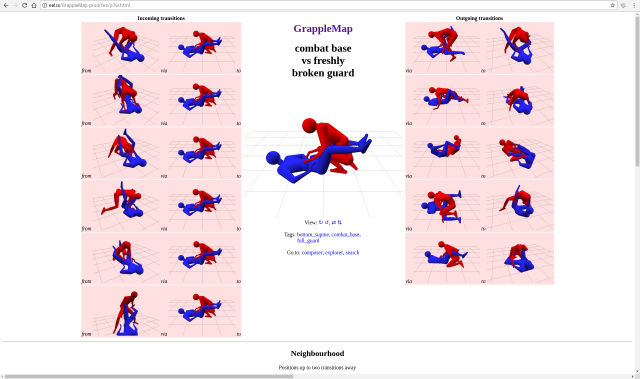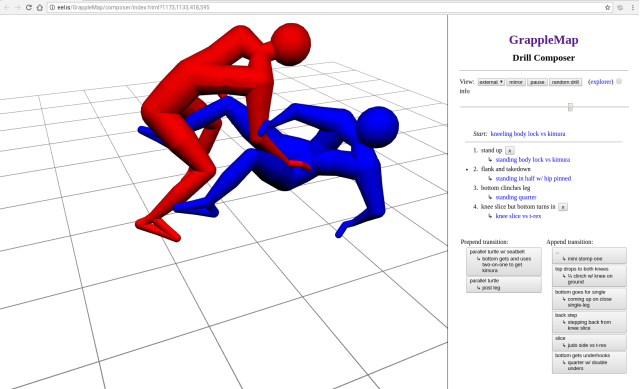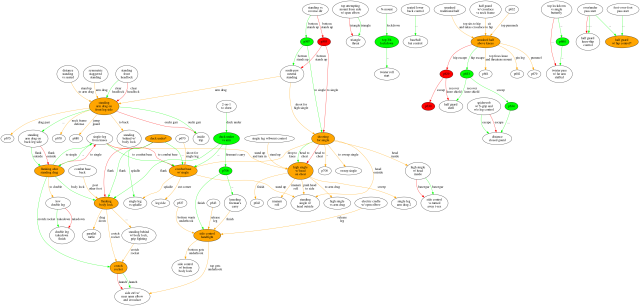The GrappleMap is:
- A database of interconnected grappling positions and transitions, animated with stick figures.
- A set of tools to build and explore this database.
The main interface for the database is the website, which has:
-
A search page:
-
Per-position pages:
In addition, there is:
-
a native editor (only built and tested on Linux)
-
a VR interface (only built and tested on Linux):
-
some utilities for making videos of scripted or randomly generated matches, like these:
-
a diff utility for summarizing changesets, e.g.:
The intent is to map as many proven MMA-applicable grappling techniques as possible, regardless of whether they come from wrestling, Brazilian Jiu-Jitsu, Judo, Sambo, etc etc.
The map only demonstrates techniques in their bare textbook form, and does not include any discussion or explanation. However, the map almost always cites source instructional materials, which readers are strongly encouraged to consult for detailed breakdowns and tactics.
Techniques are modeled in a big directed graph, where each vertex is a concrete pose of the two stick figure players, and each edge is a transition from one such position to another.
In addition to being interconnected, positions and transitions are also named and tagged. Tags are used for categorization into domains (e.g. deep_half, side_control), but also for more detailed information about poses (e.g. bottom_supine, top_posture_broken), and also for presence of any specific grips or controls (e.g. lockdown, kimura, crossface, arm_drag).
- To summarize proven techniques that address various situations
- To serve as an index into the literature, giving suggestions for specifically relevant instructional materials
- To give concrete ideas for drills to practice
- To (maybe one day) serve as training data set for machine learning algorithms to discover new jiu jitsu
- To be beautiful
If I have to do it all by myself, probably yes. But I hope that once word gets around about the GrappleMap, other grappling nerds will want to chip in and help me make it the most awesome (no-gi) grappling map ever. :)
See also Can I help map techniques?.
None; the GrappleMap code and data is released into the public domain.
There are two aspects to this: the graph structure itself, and the quality of the individual transition animations.
The graph structure itself is obviously a gross simplification. Real grappling is a continuous space where even individual positions and transitions occur in infinite variety. Still, all grappling instructionals include examples of forms that a technique can or should take. The GrappleMap tries to connect and integrate all these fragmented examples, in order to form a more complete picture.
The transition animations are pretty rudimentary, in part because they are manually edited rather than motion-captured, and in part because the animation system itself is currently based on very simplistic fixed-interval keyframes, which limits joints to 5 direction changes per second. This means that things like small-scale hand fighting and battling for grips is barely modeled at all. Usually the level of detail in the map is that a grip is either acquired without great strain, or not at all, and that's it. The timing of techniques is also not really captured at all. The animations are really just schematics showing how the different entanglements and postures flow into eachother, not live action.
I personally have no interest in gi-specific techniques, there are no such techniques in the database, and clothes are not modeled in the software (doing it right would be a lot of additional work).
If someone else wants to make GiGrappleMap, power to them!
To make creating and editing transitions as simple as possible, the stick figures originally had even fewer "joints"/"bones". I added more only as necessary to allow execution of techniques I wanted to map. This process resulted in the current stick figures, which I think strike a good balance that fits the purpose of the GrappleMap.
I'm not really interested in mapping those few rare techniques that only work for specific body types.
It's on the todo list.
Maybe later. (Patches welcome!)
Try using Chrome. It's the only browser that I've ever gotten good WebGL performance out of. :/
The database is a plain text file that declares:
-
Positions (with name, tags, description/reference, and joint coordinates)
-
Transitions (with name, tags, description/reference, and joint coordinates for each frame)
It's a pretty ad-hoc and minimalistic format, but it has the nice property that textual diffs show which positions and transitions differ, and that an ordinary text editor can be used to edit the names, descriptions, and tags.
I fully expect that the format will evolve into something different to accommodate future features.
Back in university, I trained with their MMA club for a year or so, but it was super casual, and a long time ago. I basically have no martial arts credentials whatsoever.
Absolutely! There is way too much grappling technique for me to do this by myself, so nothing would please me more than to see the GrappleMap become a collaborative effort.
Fire up the editor, read its manual, and have a go. If you get stuck, drop by in #grapplemap on Freenode IRC or mail me at grapplemap@contacts.eelis.net.
Absolutely! For ideas for things you could work on, see the todo list.








